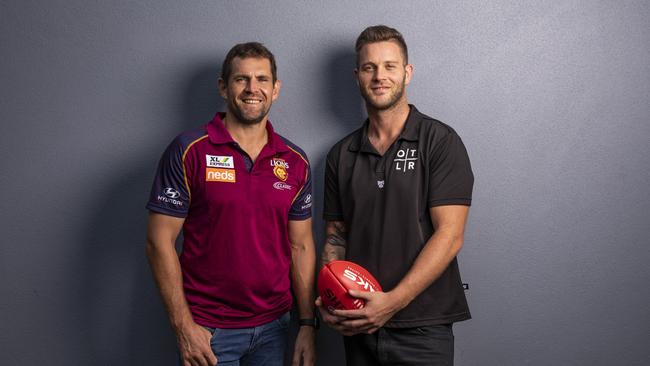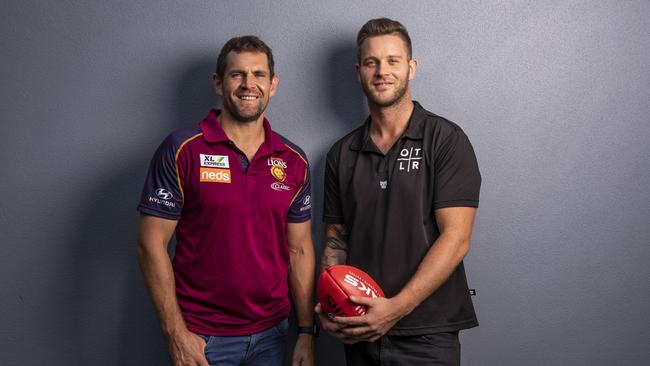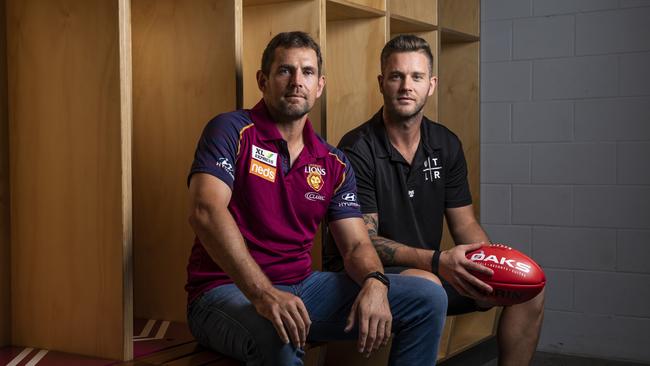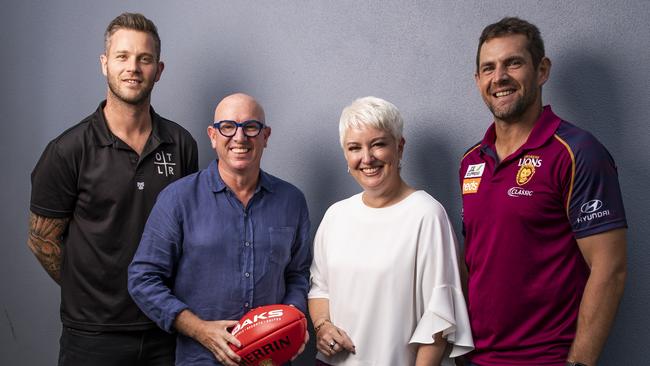AFL star’s program Outside the Locker Room aims to kick mental health stigma
He was a rising AFL star with the world at his feet but behind closed doors Jake Edwards says it was a different story.

A RISING AFL star with money in the bank, his pick of the women and a newly built house to his name at the age of just 19, Jake Edwards had the world at his feet … or so everyone thought.
Behind closed doors it was a different story. He was a petrified teenager, struggling with depression and anxiety, and had no idea where to seek help.
Outside the Locker Room mental health program for AFL players comes to SA
Ex-Eagle Daniel Kerr joins Outside the Locker Room fight to raise mental awareness
Crying, self-isolation and insomnia were part of the daily trauma, but the teenager hid things from his teammates at Carlton, until one poor game sent him off the rails.
Unable to cope, he went back to the family farm, calling the club on the way to tell them he was done with football.
“I was suffering mentally,” he recalls.
“As a 19-year-old it was confusing and I was angry because I didn’t understand why I was going through what I was going through.
“I did what every typical young male does and just closed off. I didn’t want to talk about it, I didn’t want people to know about it. I eventually had a meltdown and went to see mum and dad. I just couldn’t get out of bed.”

Edwards was diagnosed with anxiety and depression and started taking medication, allowing him to return to the club and resume his career. But he didn’t fully grasp what it meant to have a mental illness.
“It was good for me to put a title to it,” he says. “But I didn’t ask enough questions. I was pleased to just be able to pop a pill and get on with becoming a football player. I was naive and ignorant to the fact it was something that was probably going to be with me for a lifetime, and a simple pill isn’t going to be the cure.”
And his troubles were far from over.
The illness reared its ugly head a couple of years later when Edwards had left Carlton and was training with the Western Bulldogs, hoping to be picked up in the AFL draft. Despite promises from the club, he was overlooked, ending his career with devastating effect.
Edwards turned to alcohol and drugs as a means of coping as his life spiralled out of control. Eventually, after a four-day drink and drugs bender, he attempted to take his own life in his bathroom.
“It still hits me today when I look in the mirror. Emotionally it’s still something that’s quite raw for me when I imagine being physically and emotionally in that place. I thought it was the right thing to do at the time, that my family could move on and friends could stop worrying about me,” he says.
“But what I know now is everything I was saying to myself at that time was all fabricated. I didn’t think anyone cared or could understand and the easy option for me at that time was to take my own life.
“Luckily enough for me, I got to shake my old man’s hand again and I got to hug my mum again, but unfortunately there’s a lot of families of people out there who don’t get that opportunity.”
Edwards was able to spend time in rehab; he rebuilt his life and then sat down to think about what he wanted to do next.
“I worked with psychiatry and drug and alcohol support and spent three or four months defining who I was,” he explains.
“I found myself as a young man again and found sport was once again the platform that carried a lot of opportunities for me but also a platform where I had seen examples of other young men, especially in local community sport, go through the same thing I had. I wanted to do something to prevent what happened to me happening to others.”
And so Outside The Locker Room was born. The not-for-profit foundation, developed by Edwards, aims to help schools, employers, and grassroots and professional sporting clubs to understand and manage the challenges faced by youngsters today.
Launched five years ago, it has been widely adopted, with 200 sporting clubs now on board around Australia, 15 in Queensland.
With statistics showing 75 per cent of mental illnesses emerge before the age of 25, education sessions focus on a wide range of current challenges, such as suicide intervention, mental health, drugs, alcohol, domestic violence, and cyber bullying.
Now the program has received the backing of the Brisbane Lions, which has partnered with OTLR and the Epic Good Foundation to deliver increased support to youngsters in sporting communities across the state.

For Lions legend Luke Hodge, 36, it’s a huge step in the right direction.
The retired AFL player, of Hawthorne, in Brisbane’s east, has four boys – 11, seven, four and five months – and knows how difficult it can be for men to talk about their feelings.
“As a parent you want your child to grow up injury free and to have no issues at all, but that’s not realistic,” he says.
“Kids will have certain issues and problems to face and we want them to feel comfortable talking to people. We want them to be able to speak to their parents or friends or a coach or teacher and to know that there are so many people who are willing to help.
“I think it’s also important to give awareness to coaches and teachers too. Just because a kid doesn’t say he’s struggling doesn’t mean he doesn’t have issues he’s not handling.
“I think we need to probe a bit more to get an answer. Often boys will say they had a good day at school when asked how their day was, but it’s not until you really probe or ask the question in a different way that they will open up and give you more than a yes or no answer or let you know why their day was good or bad.”
Hodge, who played AFL for 20 years and retired from the Lions in 2019, regularly visits sporting clubs to talk to kids as part of OTLR.
“I’ve had teammates over the years who’ve had mental health issues and their biggest message is they wish they’d spoken up earlier.
“I think it’s starting to become more acceptable to talk now. It used to be if you had a problem you put your head down, bum up and worked your way through it, but history shows that’s not the right way to get past it and when people have an issue and talk about it to a friend or family member they always feel better.
“Kids need to understand that people are willing to listen and we aim to teach them to have the courage to speak up.
“I really enjoy being a part of OTLR because it teaches kids this from an early age so they don’t let their feelings get on top of them and then explode.
“The bottom line is kids need to open up.
“Anyone who has been through depression and mental health issues knows how important it is to talk.”
The OTLR program will be rolled out in 20 AFL clubs in Queensland over three years thanks to $500,000 from the Epic Good Foundation – an organisation supporting better health outcomes through partnerships with other groups – run by husband-and-wife team Cathie Reid and Stuart Giles.
The Indooroopilly couple, who are also founders of the Epic Pharmacy company as well as cancer care provider Icon Group, jumped at the chance to get involved after seeing the benefits of OTLR at their 15-year-old son Sam’s AFL club, Wests Juniors at Toowong.
“We were blown away by it and could see why it was achieving results after sitting through just one session,” explains Stuart, 50.
“These were boys we’ve known since they were around eight through one singular prism of football interactions, openly talking about their challenges and struggles. It was a pivotal moment for us as parents and we wanted to help get more kids benefiting from it.
“Teenage boys in particular are not encouraged or wired to have those experiences of talking about things in that setting very often.

“Schools have some fantastic programs and try really hard but in a sporting environment, I think youngsters are more comfortable and encouraged to speak openly and constructively.
“One of the reasons why it’s so successful is because there are prerecorded video messages from footy players who are idolised by these youngsters. These are men who are renowned for being physically tough and yet they are able to talk about mental health issues.
“If someone like Luke Hodge, who is the elite of the elite, gets out there and talks about the importance of looking after your mind and mental wellbeing as well as being physically fit, that resonates.”
Cathie, 50, who also serves on the board of the Brisbane Lions, says OTLR is essential for youngsters.
“If our financial support didn’t speak enough to show the importance we place on it, as parents and friends of boys and girls in these clubs we want to put in the steps early to prevent deaths,” she says.
“We are delighted to be providing positive support. The planets have aligned to make this really good program available to more kids and we are thrilled.”
With COVID-19 restrictions in place, the program is currently being accessed through an app with links to a welfare team, but Brisbane Lions community manager James Dowling hopes face-to-face education sessions will resume soon.
“Without partners like Cathie and Stuart we wouldn’t be able to provide the long-term commitment we want to,” he says.
“The funding makes the program much more accessible to community clubs so with the support of OTLR and Epic Good Foundation we can offer it at a drastically reduced rate. Everyone sees the value in it. The big thing is about reducing stigma. If we can get people to seek support through the Lions name and other partners associated with that then it’s a win for everyone.”
Edwards couldn’t agree more.
Now 32 and living in Melbourne, he has no doubt OTLR would have helped him if it had been available when he was a youngster.
But instead of dwelling on the past he’s looking to the future.
“For me, mental health is a lifetime commitment and something I work on every single day,” he says.
“I see a clinical psychologist for regular check-ins because anxiety and depression will always be a part of me, but now I have experience behind me and coping mechanisms.
“I have stability and purpose so I’m so much happier. I learned how to cope better over the years, but I want to enable others to do it sooner rather than later. OTLR is my legacy. I look at what I went through and don’t want it to be for nothing. I can help youngsters to utilise those platforms and support and not get to where I got to.”
Outside The Locker Room: otlr.org.au
If you or someone you know needs help, contact: Lifeline: 13 11 14 or lifeline.org.au
